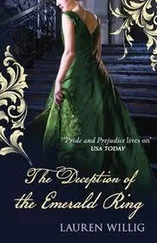He watched his wife pass the needle through the fabric several times before she became aware of an audience and looked up.
“What is your impression of Lieutenant St. Clair?” he asked.
“And here I thought it was I who inspired your reverie.” She smiled and went back to her work. “He seems a conscientious gentleman. Another individual might have passed off to someone else the trouble of conveying that sea chest to your family, rather than have the burden of it himself for so long a time—your cousin, after all, would never have known the difference. But he took that responsibility seriously. And we were certainly fortunate that he happened upon us on the Cobb when we needed assistance with Lady Elliot. Between the foundering ship and the rising storm, everybody else was too busy, but Lieutenant St. Clair suspended his own business to render aid to strangers. I think that reflects well upon him.”
Darcy silently contemplated her words, frowning in thought.
“Have you a different impression?” Elizabeth asked.
He did, but it was not fully formed. “I wonder what business brought him to the Cobb on such a morning. He was not in uniform, and therefore not performing any official duty.”
“What business brought us? Or Sir Laurence? Or any of the other people we saw promenading before the weather turned so suddenly?”
“ We thought it turned suddenly. Lieutenant St. Clair is an experienced sea officer. While aboard ship, it is his job to monitor the weather, because his life and that of the entire crew depend upon it. If he is worth his epaulette, he knew that storm was coming before we did.”
“Will you next accuse him of conjuring the storm himself?”
“He was not on the Cobb for leisure.”
“Does it matter? As you say, he is a mariner. Any number of reasons could have brought him to the Cobb. Mrs. Harville told me that the new peace has forced many in the navy to seek other work.”
That much, Darcy knew to be true. They had seen solicitation notices posted throughout Lyme by masters of private vessels offering prime wages for able seamen. Officers were also in demand, promised recompense more attractive than the half-pay they received if not actively employed by the navy.
Elizabeth set aside her work. “You have just finished reading Lieutenant Fitzwilliam’s diary, yet it is Lieutenant St. Clair who occupies your thoughts. Why? Did your cousin write ill of him?”
“Not directly.” Darcy was troubled by Gerard’s account of the gold figurines he had discovered—and Lieutenant St. Clair’s response. Perhaps the last two entries would not have bothered him so much had they appeared earlier in the diary. But falling as they did, as the final scenes in a narrative—a life—cut short, invested them with significance, real or imagined. “They had a difference of opinion over a protocol matter shortly before Gerard’s death.”
“Well, that is hardly something to hold against him.” She fixed Darcy with a penetrating stare. “I think you dislike him because of the way he looks at your sister.”
His first instinct was to refute her accusation—but it held a grain of truth, and he could not deny her perceptiveness.
“Georgiana can do better than a naval lieutenant,” he said.
“Her own cousin was a naval lieutenant.”
“Between Gerard’s determination and his family’s connexions, he would have been promoted to captain in due course. Once he made post, advancing to admiral is merely a matter of seniority. However, even had he remained a lieutenant, he would have come into the same inheritance—modest though it may be—that Colonel Fitzwilliam received when their father died, which enabled him to betroth himself to Miss Wright knowing they could live respectably. St. Clair, by contrast, has had many years in which to rise to captain, yet he has not so much as achieved the rank of commander. He is still a lieutenant, and with England now at peace, is likely to remain so indefinitely, with an income of a mere one hundred pounds a year—less, if not on active duty.”
“You assume that Lieutenant St. Clair’s income is limited to his naval earnings, when in fact we know little about the man beyond the fact that he served with your cousin. However, I expect any discussion of his fortune, or lack thereof, is irrelevant in regard to Georgiana, as her thoughts seem to be occupied by Sir Laurence Ashford since our arrival in Lyme. Did you observe how much more interested she became in attending last night’s public ball after Sir Laurence enquired whether she was going? I believe she would have danced every dance with him, had decorum allowed. And I am begun to think he might have asked her to, could he have done so. As it was, they spent a considerable portion of the evening in conversation with each other, not dancing with anybody.”
“Georgiana does appear to have become the object of Sir Laurence’s particular attention—and to be receptive to it,” Darcy said.
“Are you?”
“An object of the baronet’s distinguished notice? No. He did not ask me to dance even once. Which is just as well. I would not want to compete with my sister for his regard.”
Elizabeth laughed at his unexpected jest. “Did I just hear my husband approve of a gentleman— any gentleman—courting his sister?”
He would not give her the satisfaction of a firm reply. “Perhaps.”
“Perhaps? The Darcy I know is more decisive than that.”
He met his wife’s gaze, held it a moment … and conceded. “It is time Georgiana considered marriage. Probably past time.” He returned Gerard’s diary to the sea chest and went to sit beside her. “Sir Laurence possesses tangible assets—a title, fortune, property, family, connexions—along with his intelligence and pleasing manners. If he is her choice, she has made a sensible one.”
“Sensible—now there is a romantic word, from a man whose own choice defied the expectations of his entire acquaintance, not to mention his own judgment. I hope your preference for a sensible match for Georgiana does not mean you regret our experiment.”
“Indeed not.” He spoke softly, and she moved closer to hear him. “In fact—” He brought his hand to her cheek and bent his head toward hers. “I would say it has worked out rather well.”
“I am quite convinced that, with very few exceptions, the sea-air always does good. There can be no doubt of its having been of the greatest service to Dr. Shirley, after his illness.… He declares himself, that coming to Lyme for a month did him more good than all the medicine he took; and that being by the sea always makes him feel young again.”
—
Miss Henrietta Musgrove, Persuasion
Although the weather had cleared and the morning dawned sunny, evidence of the storm three days past yet cluttered the shore as Elizabeth and Georgiana walked down to the beach. Splintered wood and other pieces of the foundered ship lay strewn amidst the shingle, left by the tide like an offering. Occasionally a barrel washed up, exciting great interest—the merchantman had been returning from the West Indies—but most of the cargo had been lost or destroyed by the lightning bolt that claimed the ship.
The two ladies had reserved a bathing machine, one of the curious vehicles lined up on the sand like hackney cabs in Covent Garden following a theatre performance. Essentially small wooden huts on four wheels, they were designed to go where no ordinary carriage ought—straight into the water. This was to be Elizabeth’s first experience seabathing, and she looked forward to it with a mixture of excitement and trepidation. She wondered what it would feel like to completely immerse herself in the water, but also doubted the wisdom of doing so. After all, neither she nor Georgiana knew how to swim. She did not want to drown, of course, but she was almost equally fearful of making a public spectacle of herself.
Читать дальше












